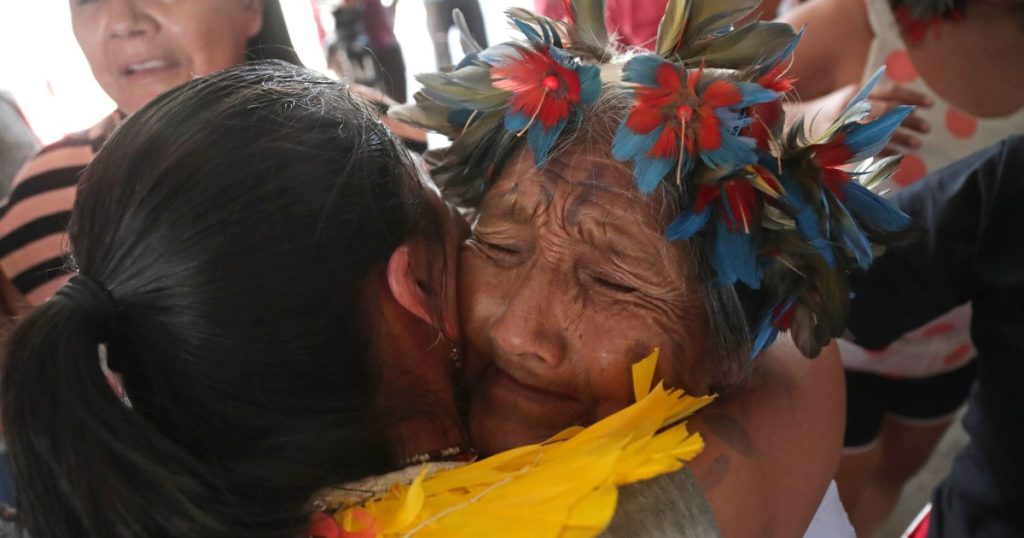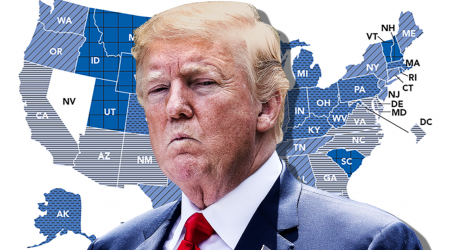Brazil’s Top Court Rejects Attempt to Thwart Indigenous Land Claims
Women embrace as they celebrate Brazil’s supreme court ruling to enshrine Indigenous land rights.Gustavo Moreno/AP
This story was originally published by the Guardian and is reproduced here as part of the Climate Desk collaboration.
Brazil’s supreme court has blocked efforts to dramatically strip back Indigenous land rights in what activists called a historic victory for the South American country’s original inhabitants.
Nine of the court’s 11 members voted against what rights groups had dubbed the “time limit trick”—an agribusiness-backed attempt to prevent Indigenous communities claiming land they did not physically occupy in 1988.
There were emotional scenes outside the supreme court’s headquarters in Brasília on Thursday, after a majority was formed to support a ruling in favor of Indigenous rights. Some activists wept with joy; others danced. “Long live Indigenous resistance,” tweeted Eloy Terena, an Indigenous lawyer who is a senior official at Brazil’s recently created minister for Indigenous peoples.
Similar scenes played out across the Amazon region, which is home to about half of Brazil’s 1.7 million Indigenous citizens. This is a “victory for struggle, a victory for rights, a victory for our history,” the Indigenous congresswoman Célia Xakriabá tweeted. “[All of] Brazil is Indigenous territory and the future is ancestral.”
Brazil’s minister for Indigenous peoples, Sônia Guajajara, celebrated what she called “a great achievement” that was the fruit of years of struggle and protest.
Only two supreme court justices voted in favour of the “marco temporal” (time marker) thesis restricting Indigenous land claims: Kassio Nunes Marques and André Mendonça. Both men were appointed to the supreme court by the former far-right president Jair Bolsonaro, who activists accused of unleashing a historic assault on Indigenous territories by dismantling protection agencies and with his anti-Indigenous and anti-environmental rhetoric. Before joining the court, Mendonça was Bolsonaro’s justice minister.
Ahead of Thursday’s decisive hearing, activists had warned the “time limit trick” could scupper scores of legitimate claims for the delimitation of Indigenous lands, from groups who had already been evicted from their ancestral lands or whose presence had yet to be recognized at the cut-off date. Many Indigenous groups were driven from their ancestral lands during Brazil’s 21-year military dictatorship which ended in 1985.
Casting her vote against a thesis a majority of justices decided was unconstitutional, judge Cármen Lúcia Antunes Rocha said: “We are caring for the ethnic dignity of a people who have been decimated and oppressed during five centuries of history.”
Brazilian society had “an unpayable debt” to the country’s native peoples, Rocha said.
The Indigenous rights group Survival International commemorated the defeat of what it called an attempt “to legalize the theft of huge areas of Indigenous lands.” Dozens of uncontacted tribes could have been wiped out had such efforts prospered, the group claimed.
“This is a momentous, historic victory for Brazil’s Indigenous peoples and a massive defeat for the agribusiness lobby,” said Survival’s research and advocacy director, Fiona Watson.
Watson said the time limit trick had been part of a “devastating assault” on Indigenous communities and the Amazon. “So this rejection of it is hugely important—not only for Indigenous peoples, but for the global fight against climate change too.”





